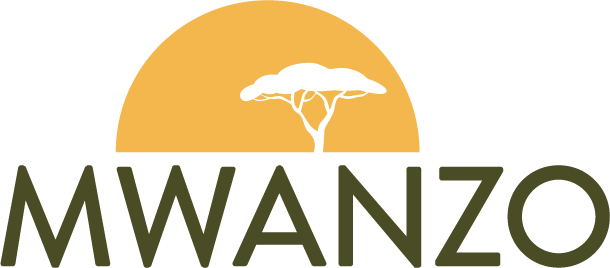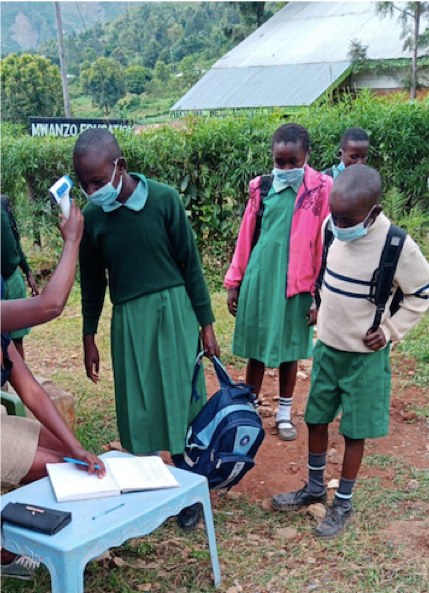Autumn Stories
RESILIENCE THROUGH A PANDEMIC
We are happy to announce all 20 of our 4th graders are back in the classroom!
Reopening safely
After months of uncertainty, the Kenyan Ministry of Education announced October 12 nationwide school reopenings for students in grades 4, 8, 12, and the final year of universities (these are the grades sitting for exams at the end of the academic year).
Safety is our top priority during this time. At the beginning and end of each day, MEC staff perform temperature checks on every student, teacher, staff member, and visitor using newly purchased instant thermometers. Mask usage is compulsory for all, and MEC is providing masks for those who do not possess one.
In order to reopen to all students in the future, schools must provide sufficient water and hand washing stations. Mwanzo will need to dig additional outhouse stalls to meet new Ministry of Public Health standards and has already entered the planning phase for doing so.
Staff at MEC conduct daily temperature checks, a key part of reopening safely.
Supporting students
Our 4th graders returning is a cause for joy. Yet, other students, especially those younger, miss school and follow the 4th graders as they go to MEC. In these cases, staff at MEC provide each student with a warm meal while ensuring adherence to safety protocols. Head Teacher Margaret Otieno reports how it breaks her heart to send them back home after the meal.
Working through a pandemic
Schools, churches, and markets closed across Kenya in March — but Mwanzo’s work did not stop.
The impacts of the COVID-19 pandemic have been sweeping and severe for people in Rabuor and beyond. Not only did students miss learning, but they also suddenly lacked the two hot meals provided daily at MEC. Family incomes suffered as markets closed and gatherings came to a halt. We reported in June on our partnerships with the University Congregational United Church of Christ (UCUCC) and One Day’s Wages to support our communities in Rabuor with food and sanitization materials. We are proud to say that since then, Mwanzo has been able to provide 200 families in high need with the above, and all our students with learning materials like textbooks and storybooks for continued education throughout the school closure.
Teachers and MEC staff have been hard at work since March ensuring this support for families and preparing for a safe reopening. Classrooms may not have been operating, but MEC building maintenance continued. Staff have also been providing community outreach education on proper sanitization, health and safety measures, and COVID-19 symptoms, in addition to actively reducing stigma around the disease.
The past months have tested the community of Rabuor, and the only certainty is that the road ahead lies similarly rough with challenges.
Rhoda Ogweno lost all but one of her children to HIV/AIDS, but has made it her life’s purpose to care for others. Rhoda currently acts as the primary caregiver for six grandchildren. She is known around the community for her good heart, and Mwanzo was humbled to provide support to her and her grandchildren during the food distribution.
AT-A-GLANCE: THE COST OF AN EDUCATION AT MEC
$5.15 feeds a child in preschool two meals per day for one month.
A full set of textbooks for an early elementary classroom costs $85.
$111 pays one month of a Grade 4 teacher’s salary.
ADAPTING TO A CHANGING CLIMATE
Farmers in Rabuor mitigate the effects of irregular rainfall that can destroy crops through flooding and drought.
Inconsistent weather patterns
While the pandemic is an unprecedented challenge for us all, the people of Rabuor are no strangers to harsh conditions. The increasing pressures of climate change have forced the community to find ways to adapt.
Once a region where the regular rainy season allowed farmers to plant and harvest crops in a predictable annual cycle, Rabuor now sees periods of both heavy rains and extreme drought. The heavy rains can cause serious flooding that washes away crops. Last season, unusual hail storms destroyed vegetables, beans, and maize nearly ready to harvest. To compound these problems, changing weather patterns have led to an increase in agricultural pests, such as the invasive armyworms that rapidly devour maize.
Innovating through difficulties
Community members are working hard to adapt to these environmental changes. Farmers in Rabuor employ conservation farming techniques, such as using manure from Mwanzo’s poultry project to fertilize vegetable gardens. As a community, farmers learn best practices to mitigate agricultural pests.
To combat the heavy rains, MEC’s cistern tanks collect rainwater. This reduces the likelihood of flooding and associated erosion. At the same time, collected water can be used for drinking, cooking, and sanitation; without the tanks, women would need to travel arduous distances to collect clean water for the school.
In addition to these measures, more innovative work is on the horizon. Recently, a group of Rabuor’s women commenced planning for community-led tree planting. This work will promote fast-growing trees to provide firewood and timber, shade-providing trees, medicinal and fruit-bearing trees, and drought-tolerant trees, and plans to eventually engage MEC students in the cultivation. The people of Rabuor find strength in each other!
FUNDING OUR WORK
Mwanzo received an emergency relief grant from One Day’s Wages to provide the food and learning materials described above to MEC families during the pandemic. This grant required matching funds, and we thank you for making this critical relief possible.
Our very first class at MEC will enter Grade 7 in just a few months! With a grant from Seattle 4 Rotary, we are proud to furnish our Grade 7 and future Grade 8 classrooms with desks, tables, and chairs. We are extremely grateful for this grant and the impact it will have on our students who will sit for their national examinations in Grade 8.
Classroom furniture correlates to increased learning outcomes, according to a World Bank report.
Mwanzo’s strategic plan moving forward includes installing a solar array on the MEC roof. The cost estimate for this project is $30,000. With generous support from an anonymous donor and the UCUCC Love and Justice Ministry, we have already secured over half the funds needed! Stay tuned for a fundraising activity in the coming months to raise what remains.
MUCH TO CELEBRATE
We are grateful to those of you who were able to join us in September for a virtual celebration of the accomplishments of the people of Rabuor in partnership with Mwanzo. If you were not able to attend, we invite you to view the celebration and dance for joy with us on your own time.







